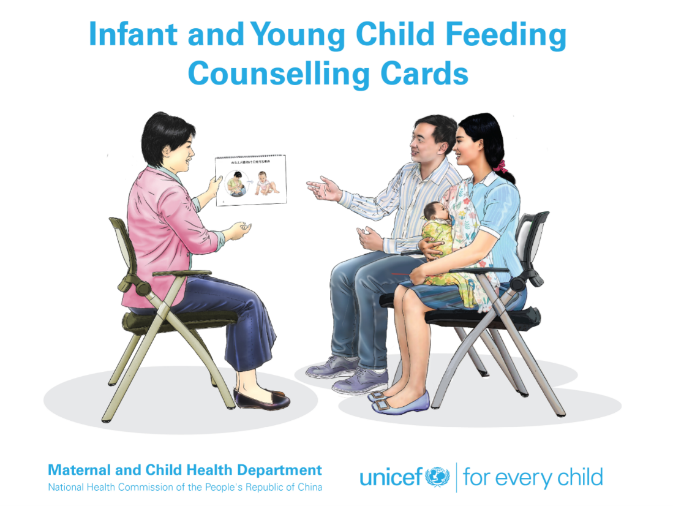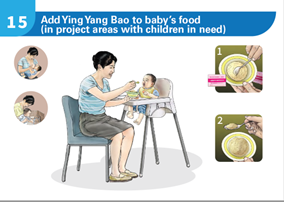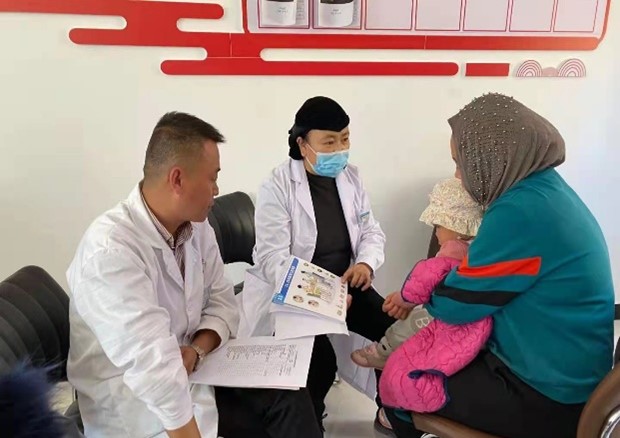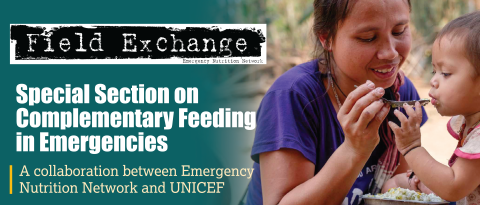China case study: Capacity building of primary health workers. From piloting to national Infant and Young Child Feeding programming
Xinya Zhu is a Nutrition Officer at UNICEF China
Shuyi Zhang is an Associate researcher at the Capital Institute of Pediatrics
Tao Xu is the Division Director of Child Health Division at the National Center for Women and Children's Health of the Chinese Center for Disease Control and Prevention (China CDC)
Suying Chang is a Nutrition Specialist at UNICEF China
Anuradha Narayan is Chief of Child Health and Development at UNICEF China
Xinya Zhu: programme coordination and implementation, writing – original draft preparation; Shuyi Zhang: Development and piloting of infant and young child feeding (IYCF) counselling package, manuscript review and editing; Tao Xu: digitisation of IYCF counselling package, national project design and implementation, manuscript review and editing; Suying Chang and Anuradha Narayan: design and guidance for implementing the programme, manuscript writing, review and editing. All authors have read and agreed to the published version of the manuscript.
Introduction
As the most populous country in the East Asia and Pacific Region – and, indeed, the world – programming successes across China play an important role in shaping regional nutrition statistics.
China has made considerable progress in reducing the prevalence of stunting and wasting, but anaemia prevalence has not decreased as expected, and infant and young child feeding (IYCF) indicators remain suboptimal. Since 2012, efforts have focused on the implementation of the Nutrition Improvement among Children in Poor Rural Regions Programme, which provides a soybean powder-based complementary food supplement called Ying Yang Bao (YYB)1 to children aged 6-23 months living in poor rural areas (Huo & Chen, 2015). By the end of 2020, the YYB programme had been expanded to all 832 previous poverty counties2 in the country, benefiting approximately 11.2 million children. However, after three years of implementation, there had been limited improvement in indicators related to complementary feeding practices.3
To address this challenge, the implementation of a community IYCF counselling package has been prioritised to improve feeding practices in China. The main purpose of this package was to improve the capacity of health workers to provide counselling for caregivers in addition to the YYB distribution. The process involved the development of a training curriculum and adapted counselling materials, followed by piloting the package and national scale-up.
Development of the IYCF counselling package
In 2019, UNICEF and the National Health Commission (NHC) began the adaptation of the UNICEF community IYCF counselling package to the national context. Adaptation included the selection of priority messages according to China’s context, a review of the content using a national expert panel and piloting. As a result, materials were developed using a lifecycle approach in alignment with the National Essential Public Health Service Package. In addition, there was a particular focus on responsive care-giving practices, as well as information related to limiting consumption of ultra-processed foods to address the risk of childhood overweight. The adapted national counselling package, entitled “IYCF Counselling: A Training Curriculum and Practical Guide for Primary Health Workers”,4 along with 16 counselling cards, was released jointly with NHC during World Breastfeeding Week in 2021.


Piloting in rural areas of Qinghai province
The adapted package was also piloted in five counties of Qinghai province located in north-western China, where all children aged 6-23 months are covered under the YYB programme. Despite this, the quality of complementary foods was relatively poor (Zhang et al, 2016), providing an opportunity to pilot the integration of IYCF counselling into the YYB programme and to assess improvements in complementary feeding practices alongside YYB delivery and services. In the Qinghai pilot, 35 county maternal and child health (MCH) workers, 130 township MCH workers and 850 village doctors were trained between 2019 and 2021, and the package was further revised based on feedback and results.
Pilot training in Qinghai led to the provision of over 13,000 IYCF counselling sessions by township and village doctors to benefit more than 10,000 children under the age of two and their caregivers in project counties during the two-year period.
To assess results, baseline, midline and endline e-surveys were conducted with stratified sampling with nearly 1,000 caregivers of children aged 6-23 months from five project counties in October 2019, February 2021 and December 2021 respectively. Results showed a positive change in IYCF practices and YYB services as measured by two indicators: compliance rate for the YYB,5 and minimum dietary diversity of children.6 From baseline to endline, YYB compliance rate increased from 80% to 92%, and the percentage of children aged 6-23 months achieving minimum dietary diversity increased from 66% to 82%, demonstrating the relevance of the community IYCF counselling package.
Issuance of a Breastfeeding Promotion National Action Plan and IYCF scale-up programme
At the same time, in 2021, NHC, together with 14 related ministries, issued a new Breastfeeding Promotion Action Plan (2021-2025), which emphasised the role of primary health workers in supporting IYCF and the need for investing in their capacity. As a part of this effort, the MCH Department of NHC, in partnership with UNICEF, released a plan for the national scale-up of the community IYCF counselling package in May 2022, building on the success of the pilot. This national scale-up programme aimed to build the capacity of more than 290,000 primary health workers at township and village level in 1,212 counties (including all 832 YYB counties) across 31 provinces by mid-2023, facilitating the provision of skilled IYCF counselling and benefiting more than five million children under the age of two. The linking of the national YYB programme and the community IYCF counselling programme is now a reality across the entire country, with a focus on vulnerable counties.

Key features of the national IYCF scale-up programme
a) Update of national technical documents
Key IYCF messages were updated in the Chinese Dietary Guideline (2020) and the National IYCF Education Messages for Health Workers (2020) issued by NHC, following the adaptation and use of the community IYCF package. This demonstrates the opportunity to align national and global best practices and to ensure consistency across policy documents.
b) Adaptation and digitisation of the training package
To support the need for significant scale-up and to mitigate the impact of COVID-19-related restrictions, three types of IYCF training modalities were developed to ensure tailoring towards the time availability and knowledge level of participants, as follows:
- Three-day face-to-face training sessions were provided for facilitators at national and provincial level
- Two-day group training sessions guided by online courses and a one-day practical session for facilitators were provided at county level
- Two-day online self-study course accompanied by a one-day practical session were provided for township MCH workers and village doctors
The combination of online and in-person training was adopted as China has a highly literate health workforce with good digital access but a heavy workload, especially at township and village level.
All materials, including the online course, were made available through the online training platform of the National Center for Women and Children’s Health (NCWCH).
c) Integration of IYCF counselling and practice indicators into existing platforms
Indicators to assess the quality of IYCF counselling services and practices have been updated and integrated into the national YYB monitoring system. A standardised IYCF assessment form to monitor individual feeding practices was rolled out for future inclusion in the National Essential Public Health Service Package, which helps identify children at risk and establish strong referral links between basic public health services and community IYCF counselling.
d) Digitisation of IYCF counselling services and education for caregivers
To enable access to a larger number of caregivers and obtain real-time user feedback for programme monitoring, UNICEF worked with NCWCH to design and integrate an IYCF module into a mobile application called the Healthy Family App managed by NHC.7 This app can reach millions of caregivers and health workers in China. The integrated IYCF module includes IYCF education materials for caregivers and tools for health care workers to guide IYCF counselling services and conduct assessment of complementary feeding practices.
References
Huo J & Chen J (2015) Ying Yang Bao: Improving complementary feeding for China’s children. Journal of Nutritional Science and Vitaminology. https://www.researchgate.net/publication/284547103_Ying_Yang_Bao_Improving_Complementary-_Feeding_for_China's_Children
Zhang Y, Wu Q, Wang W, et al (2016) Effectiveness of complementary food supplements and dietary counselling on anaemia and stunting in children aged 6–23 months in poor areas of Qinghai Province, China: A controlled interventional study. BMJ open, 6, 10, e011234. https://doi.org/10.1136/bmjopen-2016-011234
1 YYB is a soybean powder-based micronutrient supplement providing energy, protein, fat and carbohydrates, as well as vitamin A, B1, B2, B12, vitamin D3, folic acid, calcium, iron and zinc.
2 In 2021, China declared the end of absolute poverty in the country.
3 32.0% ,75.3% and 63.4% of children aged 6–23 months achieved a minimum acceptable diet, minimum meal frequency and minimum dietary diversity respectively (data from the internal YYB programme monitoring report in 2015).
4 Detail of IYCF counselling training package in China can be checked at https://www.unicef.cn/en/iycf.
5 The compliance rate of the YYB was defined as children aged 6–23 months who ate one sachet of YYB per day, at least four days per week.
6 Minimum dietary diversity was defined as children given at least four out of seven food groups every day.
7 Details of the Healthy Family App can be checked at https://www.unicef.cn/en/press-releases/transforming-millions-childrens-and-mothers-lives-china-through-improved-health.


